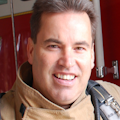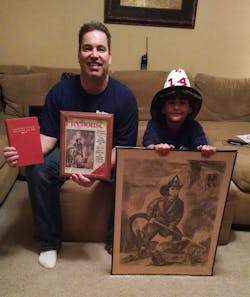40th Anniversary: The Great Responsibility to Save Lives & Keep Families Together
Being a third-generation firefighter, whose family fought fires for the city of Boston from 1929 to 1995, Firehouse Magazine was a constant fixture in my home, as well as a copy of Dennis Smith’s award-winning book Report from Engine Company 82. I remember reading Report from Engine Co. 82 as one of my first books, staring at the photo of then-FDNY Firefighter Smith taking off his boots on a large bench in his station, and wondering about the excitement and honor of being a firefighter.
I also remember anxiously waiting each month for Firehouse Magazine to arrive at our house. During the early years of Firehouse, the back page of the magazine depicted a scene with conversation bubbles hovering over firefighters and even fire horses, and challenging firefighters to submit their thoughts on the funniest possible conversation they could be having. Every month my father and I would sit down and discuss the scene and laugh as we tried to come up with the corniest words to fit the scene and make our submission. I don’t remember if we ever won that monthly competition, but that was never the point. My father retired from the Boston Fire Department on disability—a disability from which he passed away in 1997—and those days with Firehouse Magazine, and the laughs and discussions with my dad, are some of my fondest.
While there was never a doubt in my youth that one day I would follow my family into the fire service and become a firefighter myself, I would have never imagined that I would also become a presenter at Firehouse conferences, rubbing elbows with the giants of today’s fire service; write articles for Firehouse Magazine and Firehouse.com; and be involved at this level during what I believe is a major paradigm shift in the American fire service. Throughout the years, Firehouse has steered us through, and even ushered in, many shifts and changes in our profession. Today we stand upon the cusp of another shift—one in which prevention is becoming an increasingly accepted part of daily fire department services and operations.
My family members were firefighters in a large metropolitan fire department during the 1960s and 70s, when America was burning, and they responded to more working fires in a shift than many of us today will respond to in a year. In 1973 a national report titled America Burning published findings that plainly illustrated the need for, and the responsibility of, the fire service to be more active in fire prevention. I still have copies of my father’s first company inspection forms from tenements and businesses in his district, and I remember his complaints about having to do inspections because he felt no one cared or listened. However, his generation of firefighters was successful in reducing the number of fires and deaths in our nation, as well as firefighter deaths per year, which peaked at 174 in 1978. We are now down to 64 in 2015, according to an NFPA report. That generation led the way, and it’s up to us to pick up that torch.
This generation of my family has all passed away, save for one cousin who is nearing retirement but still getting it done in one of the busiest fire departments in the country. They passed away as relatively young men and from common causes that we in the fire service know all too well—emphysema, cancer, heart attacks. Their passing left daughters without fathers to walk them down the aisle, empty seats at graduations and football games, and grandchildren without a knee to bounce upon—grandchildren who are unable to gain the wisdom and guidance that only a grandfather can impart. I saw the loss, felt the loss, and lived the loss. My decorated Boston firefighting father never saw his granddaughter go to her first day of school and never met his grandson. Both my children will only know him from photos and stories, and while these stories of legend will bring them pride, it will bring equal sadness, and I assure you that their lives would have been more enriched if they had met him in person and heard those stories firsthand.
This paradigm shift is not only important for the citizens we serve but just as equally important for our profession’s vitality and the lives of our firefighters sitting to our left and right. Today’s society is changing, along with our community values and expectations, and prevention will help us exceed those expectations and keep us a valued daily service. Where there is smoke there is fire, and every wisp of smoke carries with it a plethora of carcinogens that may end our careers early or shorten our retirement. Prevention either prevents the creation of toxic gas or its growth and spread.
Today, each time I pick up Firehouse Magazine, it’s like picking up a family photo album, filled not only with emotion and memories, but also with families and stories. It ties us to the firefighters of our legendary past and the lessons they left us. I miss my father, and he was taken from us too early. However, within the stories of Firehouse are messages plainly written, or sometimes between the lines, lessons that will keep us healthy and with our families, so that this generation of firefighters will watch their children achieve their dreams and pass their wisdom onto their grandchildren.
I am honored to be a part of Firehouse, and I am thankful to Firehouse for all the information and guidance it has provided over the last 40 years, and thankful for the all the filled graduation seats and bridal hands walking down the aisle due to its leadership, friendship and being a medium for all of us who care about our profession and those we love, both at home and at the station. Above all, I thank them for the memories with my father and the laughs over conversation bubbles and fire horses, and the bonding that still serves me today when the tones drop, or most importantly, when I am out trying to prevent them from dropping.
About the Author

Daniel Byrne
DANIEL BYRNE is a community support officer for the Burton Fire District, Beaufort County, SC, and a retired assistant fire chief of training for the Georgia Air National Guard 165th Fire Department. A third-generation firefighter, he holds an associate degree and a bachelor’s degree in fire science as well as a master’s degree in public administration and disaster management. Byrne is an alumnus of the National Fire Academy. He received state and local awards for public relations and educational programs as well as community partnerships and served as a conference presenter and keynote speaker.
